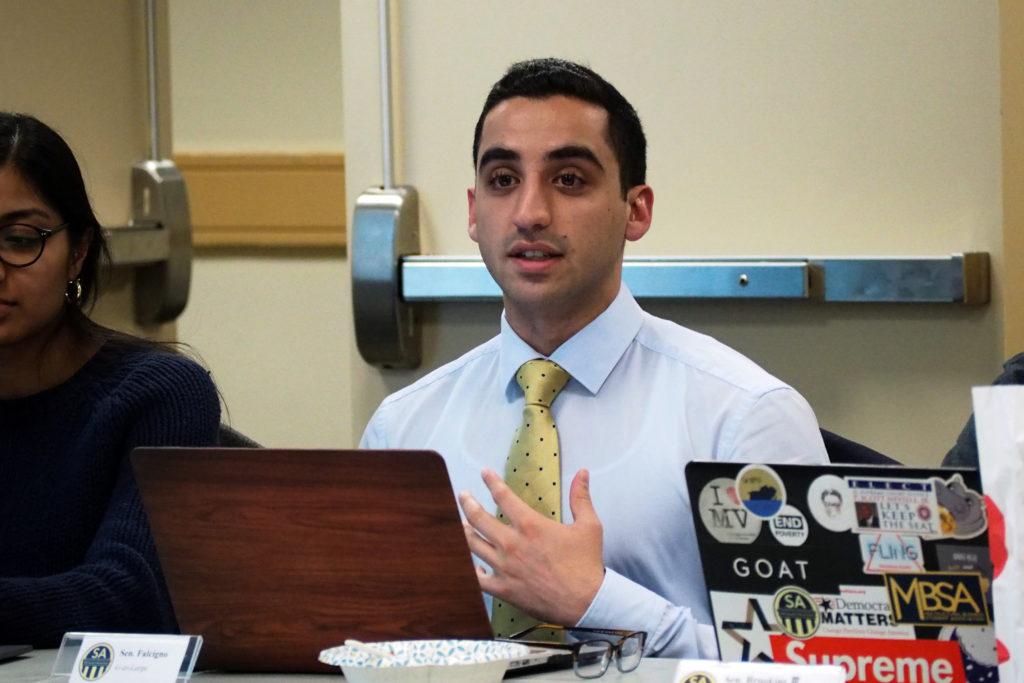Overhauls to the Student Association’s bylaws are set to take effect this week, increasing the number of committees in the body and reforming election guidelines.
The SA formed the constitutional transition task force in the fall to ensure no discrepancies exist between the SA bylaws and the changes made to the constitution last spring, which updated SA financial allocations and reformed elections. The SA Senate approved the new bylaws last month through the SA Modernization Act, which will go into effect Saturday.
SA Sen. Thomas Falcigno, CPS-G and the chair of the task force, said he and the 13 other constitutional transition task force members started going through the bylaws “line by line” in December to resolve language that was “redundant or inconsistent” with the updated constitution.
“It is my hope that the set of bylaws we’re giving to next year’s Student Association is one that they can actually fully operate on,” Falcigno said. “That they don’t need to waive bylaws or ignore bylaws, that they can truly operate and follow the letter of the law with a set of bylaws that actually makes sense.”
Students approved a referendum last spring to update the language in the SA constitution, clarifying the body’s separation of powers and including more inclusive pronouns in the document.
Falcigno said one of the most significant changes was increasing the number of committees in the SA from four to nine because the committees were designed for graduate students. He said two of the previous committees, the student life committee and the academic affairs committee, were divided into separate committees for undergraduate and graduate students to address the “different issues” they face.
Falcigno said the updated financial services and allocations committee, previously called the finance committee, will focus on legislation related to administrative affairs involving the Office of Student Financial Assistance, University investments and the Student Services Hub. He said committee members will continue to be responsible for allocating funds to support student organizations and the SA.
He said the newly created physical facilities and urban affairs committee will deal with campus operations, including food services, which currently falls under the student life committee’s purview. He said the committee will include a permanent sustainability subcommittee, which will allow members to consider legislation specific to how campus operations can be more sustainable.
“It is housed under physical facilities because we know that a lot of sustainability issues go through physical facilities, so we wanted to make sure that there was some connection there,” Falcigno said. “But we also had an opportunity for sustainability to have its own cause, per se, or its own forum.”
Falcigno said the updates also permit virtual participation in SA meetings once all students can return to campus because technology allowed for more remote involvement throughout the COVID-19 pandemic. He said the previous policy that required physical attendance for members to be considered present at meetings made attendance difficult for members who lived off campus or were enrolled in distance-learning programs.
“We’ve allowed for people to attend virtually and partake in committee meetings in that way,” he said. “That can really open up a lot of doors for students to partake and be part of the Senate, if they can do it virtually.”
Joint Elections Commission Chairperson Chloe Wagner said the SA’s previous bylaws, like those pertaining to methods of ranked-choice voting, were “not in line” with the constitution or JEC election guidelines. She said the updates will help ensure that all students understand election procedures, regardless of whether or not they are involved in the SA.
“Everyone should be able to understand what’s required of the candidates and the JEC,” Wagner said. “Updating the bylaws hopefully will mitigate some confusion that we’ve seen over the past years.”
The senate voted to update the bylaws with the Election Modernization Act last week, reducing the number of signatures required for SA candidates to run for office. The new bylaw requires presidential and vice presidential candidates to receive 1.5 percent of their constituency’s signatures, undergraduate senator candidates to receive 1 percent and all other candidates to receive .25 percent to qualify for the ballot.
She said the updated language also identifies the percentage of votes that senate candidates must earn to win in races for school constituencies with more than one seat. That percentage is calculated by dividing 100 by one more than the number of seats open in the election, according to the legislation.
She said after the recent SA elections, she made herself available to all candidates to hear feedback about potential changes to the electoral process. She said she brought their concerns to the constitutional transition task force to be considered in the updated bylaws.
“Hopefully people who have concerns or were disappointed with the results see some of the changes that they wanted to in this updated legislation,” Wagner said.
Executive Vice President Catherine Morris said updating the bylaws was necessary to “better accommodate” the student body and to “seamlessly” transition the SA to its new constitution. She said the new provision allowing standing officers of the Executive Cabinet to authorize the removal of the president marks an improvement from the previous “inadequate” process.
She said the restructured standing committees – education policy, campus services, financial services and allocations and student life – are split between graduate and undergraduate members to better serve each constituency’s priorities. She said the standing positions of chief of staff, treasurer, legislator general and communications director will work with a set of secretaries to foster collaboration between the executive and legislative branches under the updated bylaws.
“For us at the SA, representing a student body of over 27,000, we have constantly changing needs, from the policy priorities of our students to the administrative leaders we work with,” Morris said in an email. “Relying on age-old structures to propel a complex, large organization like us would be a mistake.”







